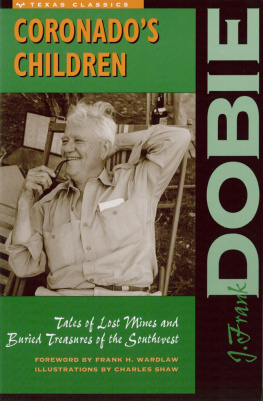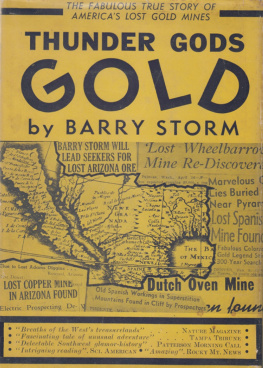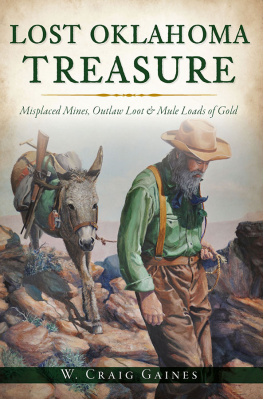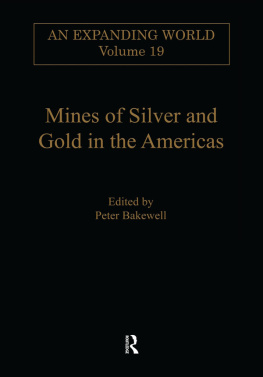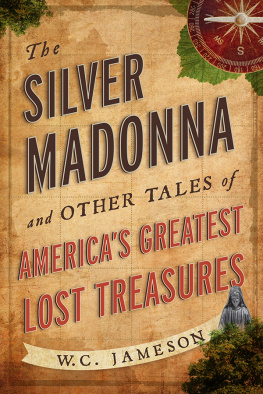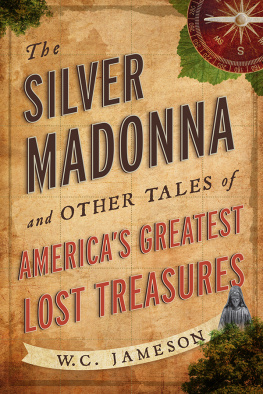Coronados Children
Baker Texas History Center Series, No. 3
J. FRANK DOBIE
Coronados Children
Tales of Lost Mines and Buried
Treasures of the Southwest
Foreword by Frank H. Wardlaw
Illustrations by Charles Shaw

University of Texas Press,
Austin
ISBN 978-0-292-71052-8 (paper)
Library of Congress Catalog Card Number 78-58925
Copyright 1930 by the Southwest Press;
copyright 1958 by J. Frank Dobie;
copyright 1978 by the University of Texas Press
All rights reserved
ISBN 978-0-292-74924-5 (e-book)
ISBN 9780292749245 (individual e-book)
Thirteenth paperback printing, 2011
Requests for permission to reproduce material from this work should be sent to Permissions, University of Texas Press, P.O. Box 7819, Austin, Texas 78713-7819. utpress.utexas.edu/about/book-permissions
To my mother
ELLA BYLER DOBIE
who has so often delighted me with
conversational sketches of such
characters as enter this book
and to the memory of my father
R. J. DOBIE
a clean cowman of the Texas soil
The Precious Ability to Wonder
Great literature transcends its native land, but none that I know of ignores its soil, wrote J. Frank Dobie in 1936.
When his colleagues in the English department at the University of Texas objected to his proposal that he teach a course on life and literature in the Southwest on the grounds that the region had produced little literature worthy of note, Dobie responded: It has plenty of life; Ill teach that.
Life and literature, while not always synonymous, were closely linked in the thinking of this remarkable man. Few American writers have contributed so much to the preservation of the history and legends of a region or done so much to enrich its literature and its life. It is a fortunate thing indeed that the Southwests foremost apostle of regionalism should have also been an implacable foe of provincialism. Unless the region has elements of the universal, it is country-minded and is, therefore, damned, he wrote.
There was always much of the universal in Dobies own writings, even though they sprang straight from the rocky Texas soil. Not only the Southwest but American literature in general would be vastly poorer without A Vaquero of the Brush Country, Coronados Children, Apache Gold and Yaqui Silver, The Voice of the Coyote, and his remarkable companion volumes The Longhorns and The Mustangs which reveal him as a solid historian as well as a fine teller of tales.
Nothing could be more fitting than for Coronados Children, Dobies second major work and one of his finest, to be republished by the University of Texas Press. Although he was no longer a member of the University of Texas faculty when the Press was established in 1950 he contributed enormously to the development of its program. With the single exception of Walter Prescott Webb, he did more than anyone to establish the character and tone of its regional list. Nearly every Texas book which we published was subjected to his scrutiny. The slightest hint of provincialism drew his instant wrath. He couldnt resist writing on the margins of manuscripts he read for us. Of one book he wrote, The author is a damned egotistic Philistine. Of another, His world is no bigger than the Texas Panhandle. Of yet another, There are three lies in the first paragraph. Once we had to erase the word bullshit twenty times from the margins of a manuscript before returning it to its author.
Frequently Frank Dobie would telephone me at the office and say, Come by to see me, but make it the right time of day. I would find him, with our mutual friend Jack Daniel, under a big Spanish oak in the backyard of his home on Waller Creek, his boots off and his hat pushed back on his tousled white head. There we would sit until the evening star grew dim talking about all sorts of things but mostly about books.
Once we were joined by an ancient and bedraggled treasure hunterone of Coronados childrenwho had read Franks tales of lost mines and buried treasures and who wanted more specific advice about how to find them. Dobie greeted him warmly and engaged him in extended but indeterminate conversation before sending him on his way to El Dorado. On another occasion, Frank told me, a treasure hunter turned up with a map of an area discussed in Coronados Children and demanded that Dobie pinpoint the location of a lost mine. Dobie told him sadly that he didnt really know where it was, but the prospector persisted. Finally Frank closed his eyes and marked a spot on the map with his pen; the old man left happy.
In Herbert Faulkner Wests copy of Apache Gold and Yaqui Silver, Dobie wrote in 1951: These people had nothing but hope. They were rich in it. As I grow older I wonder if any other form of wealth is more enriching to lives...
In the pages of Coronados Children you will meet many of these men of hope, following the same gleam which lured Coronado across half a continent and sent the gold-rushers over the mountains and deserts to California. In essence, but not in detail, these tales of treasure hunters are preserved just as Frank Dobie heard them. He never claimed to be a folklorist in the professional sense. He admitted that he had a constructive memory and that after I have heard a tale I do all I can to improve it. He had no patience with folklorists who were slaves to tape recorders.
The readers of this new book will find as much delight in it as did the readers of the first edition in 1930. Coronados Children, wrote Dobie, still have the precious ability to wonder.
During his last illness Frank Dobie told his doctor: I dont want any more of your damned pills. I just want my vitality. His vitality persists, as strong as ever, in the hearts of his friends and in the pages of his books, one of the finest of which you now hold in your hands.
Frank H. Wardlaw
Director, University of Texas Press, 19501974
College Station,
Director, Texas A&M University Press, 19741978
Texas
April, 1978
In the Beginning
These tales are not creations of mine. They belong to the soil and to the people of the soil. Like all things that belong, they have their roots deep in the place of their being, deep too in the past. They are an outgrowth; they embody the geniuses of divergent races and peoples who even while fiercely opposing each other blended their traditions. However all this may be, the tales are just tales. As tales I have listened to them in camps under stars and on ranch galleries out in the brush. As tales, without any ethnological palaver, I have tried to set them down. So it is with something of an apology that I make even a brief explanation before plunging into a veritable Iliad of adventures.
In March, 1536, four hundred years ago tomorrow, a party of Spaniards scouting in the wild lands against the Gulf of California came suddenly upon a spectacle more strange and unexpected than the footprints which greeted Robinson Crusoes eyes on the desert island. The spectacle was a white man all but naked, his nakedness partly concealed by an uncouth tangle of long hair and beard, his nationality revealed only by wild and whirling words. He was accompanied by a Moor called Estevanico, or Stephen, and eleven Indians. He gave his name as Cabeza de Vaca. He told how he had been shipwrecked on the coast of Florida a continent away and how, passing from tribe to tribe, his life often threatened by starvation, thirst, and savage enemies, he had for eight long years been beating west. He had seen much and heard more. Somewhere to the north, he said, was a galaxy of cities the inhabitants of which wore civilized raiment, lived in palaces ornamented with sapphires and turquoises, and possessed gold without endthe Seven Cities of Cbola.

